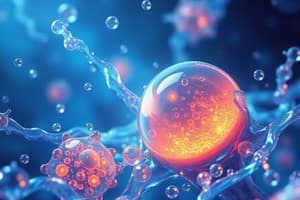Podcast
Questions and Answers
What is the effect of decreased levels of calcium and magnesium on the sodium-potassium pump?
What is the effect of decreased levels of calcium and magnesium on the sodium-potassium pump?
- It has no effect on the pump.
- It increases the release of sodium.
- It enhances the pump's activity.
- It decreases the pump's activity. (correct)
Which condition is characterized by decreased aldosterone levels?
Which condition is characterized by decreased aldosterone levels?
- SIADH
- Conn's disease
- Addison's disease (correct)
- Cushing syndrome
What is a complication of osteoporosis related to calcium levels?
What is a complication of osteoporosis related to calcium levels?
- Increased bone density
- Enhanced muscle contraction
- Fragility due to calcium excretion (correct)
- Improved bone healing
What is Trousseau’s sign indicative of?
What is Trousseau’s sign indicative of?
What happens when aldosterone levels increase in the body?
What happens when aldosterone levels increase in the body?
What percentage of water in the body is obtained through ingestion?
What percentage of water in the body is obtained through ingestion?
Which process describes the movement of water molecules from low concentration to high concentration?
Which process describes the movement of water molecules from low concentration to high concentration?
What is the main function of electrolytes in the body?
What is the main function of electrolytes in the body?
What is the normal range for sodium levels in the blood?
What is the normal range for sodium levels in the blood?
Which of the following electrolytes is not classified as a main regulator of fluid?
Which of the following electrolytes is not classified as a main regulator of fluid?
What is a characteristic of both osmosis and diffusion?
What is a characteristic of both osmosis and diffusion?
How is metabolic water generated in the body?
How is metabolic water generated in the body?
Which electrolyte condition is considered rare and typically involves healthcare workers attempting to elevate magnesium levels?
Which electrolyte condition is considered rare and typically involves healthcare workers attempting to elevate magnesium levels?
What is the definition of a hypotonic fluid?
What is the definition of a hypotonic fluid?
Which of the following is an example of an isotonic fluid?
Which of the following is an example of an isotonic fluid?
What condition is indicated for the use of hypertonic fluids?
What condition is indicated for the use of hypertonic fluids?
Which of these statements about isotonic fluids is true?
Which of these statements about isotonic fluids is true?
What is a consequence of administering hypotonic fluids?
What is a consequence of administering hypotonic fluids?
Which type of saline is considered hypertonic?
Which type of saline is considered hypertonic?
What should be monitored when administering isotonic fluids?
What should be monitored when administering isotonic fluids?
Which of the following conditions could lead to cell dehydration?
Which of the following conditions could lead to cell dehydration?
Flashcards
Sodium and Calcium Relationship
Sodium and Calcium Relationship
Increased calcium (Ca) leads to decreased phosphate (P). Calcium and magnesium compete for muscle function; decreased calcium and magnesium affect the sodium-potassium pump.
Aldosterone's Role
Aldosterone's Role
Aldosterone conserves sodium (Na) and promotes potassium (K) excretion.
Hypocalcemia/Hypomagnesemia Signs
Hypocalcemia/Hypomagnesemia Signs
Hypocalcemia and hypomagnesemia can cause muscle spasms, like Trousseau's sign (hand/wrist spasm with blood pressure cuff) and Chvostek's sign (facial muscle twitch with cheek tapping).
Calcium's Function
Calcium's Function
Signup and view all the flashcards
Phosphate's Function
Phosphate's Function
Signup and view all the flashcards
Water composition in the body
Water composition in the body
Signup and view all the flashcards
Water excretion pathways
Water excretion pathways
Signup and view all the flashcards
Water's functions
Water's functions
Signup and view all the flashcards
Electrolyte importance
Electrolyte importance
Signup and view all the flashcards
Electrolyte imbalance & range for Sodium
Electrolyte imbalance & range for Sodium
Signup and view all the flashcards
Electrolyte imbalance & range for Potassium
Electrolyte imbalance & range for Potassium
Signup and view all the flashcards
Cellular transport mechanisms
Cellular transport mechanisms
Signup and view all the flashcards
Fluid balance
Fluid balance
Signup and view all the flashcards
Isotonic Fluid Definition
Isotonic Fluid Definition
Signup and view all the flashcards
Hypotonic Fluid Definition
Hypotonic Fluid Definition
Signup and view all the flashcards
Hypertonic Fluid Definition
Hypertonic Fluid Definition
Signup and view all the flashcards
Isotonic Fluid Indication
Isotonic Fluid Indication
Signup and view all the flashcards
Hypotonic Fluid Indication
Hypotonic Fluid Indication
Signup and view all the flashcards
Hypertonic Fluid Indication
Hypertonic Fluid Indication
Signup and view all the flashcards
Isotonic Fluid Examples
Isotonic Fluid Examples
Signup and view all the flashcards
Blood pH Level
Blood pH Level
Signup and view all the flashcards
Study Notes
Water in the Body
- 70% of the human body is water
- Water intake: ingestion (90%), metabolic water (10%)
- Water excretion: urine, sweat, feces, insensible loss (respiration, evaporation)
Water Functions
- Temperature regulation
- Cell shape maintenance
- Lubrication (e.g., synovial fluid)
- Absorption and digestion (starts with saliva)
- Nutrient transport
- Waste excretion
- Blood is 83% water
Cellular Transport Mechanisms
- Osmosis: Low to high concentration of water molecules
- Diffusion: High to low concentration (no energy required)
- Filtration: Takes place in the kidneys
- Active Transport: Requires energy (ATP)
Electrolytes
- Sodium: 135-145 mEq/L; high or low levels (hypernatremia/hyponatremia) affect water balance
- Chloride: 95-105 mEq/L; high or low levels affect metabolic processes
- Potassium: 3.5-5.0 mEq/L; Imbalances (hyperkalemia/hypokalemia) can be dangerous
- Calcium: 8.5-10.5 mg/dL; Crucial for bone health and various bodily functions
- Magnesium: 1.5-2.5 mg/dL; Important for muscle and nerve function, also for Na/K pump
- Phosphate: 2.25-4.5 mg/dL; Involved in bone formation and energy metabolism
Aldosterone
- Regulates sodium and potassium balance
- Decreasing aldosterone causes a decrease in sodium.
Calcium
- Critical for bone health and structure
- Osteoporosis: Bone loss due to a slowdown of calcium release from bones, making bones less dense and fragile
- Medications can affect the release of calcium
Phosphate
- Important for bone building.
Fluid Types
- Isotonic: Equal concentration of water, stay the same
- Hypotonic: Less concentration of water, results in cell swelling
- Hypertonic: Greater concentration of water, results in cell shrinking
Acid-Base Balance
- pH: 7.35-7.45; normal range for blood acidity/alkalinity
- CO2: 35-45 mmHg; normal CO2 levels
- HCO3: 22-26 mEq/L; crucial for maintaining the acid-base balance
Studying That Suits You
Use AI to generate personalized quizzes and flashcards to suit your learning preferences.




